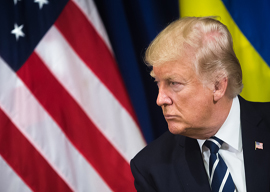
April 06, 2018

With ISIS on the run in Syria, President Trump this week declared that he intends to make good on his promise to bring the troops home.
“I want to get out. I want to bring our troops back home,” said the president. We’ve gotten “nothing out of the $7 trillion (spent) in the Middle East in the last 17 years. … So, it’s time.”
Not so fast, Mr. President.
For even as Trump was speaking he was being contradicted by his Centcom commander Gen. Joseph Votel. “A lot of good progress has been made” in Syria, Votel conceded, “but the hard part … is in front of us.”
Moreover, added Votel, when we defeat ISIS, we must stabilize Syria and see to its reconstruction.
Secretary of State Rex Tillerson had been even more specific:
“It is crucial to our national defense to maintain a military and diplomatic presence in Syria, to help bring an end to that conflict, as they chart a course to achieve a new political future.”
But has not Syria’s “political future” already been charted?
Bashar Assad, backed by Iran and Russia, has won his seven-year civil war. He has retaken the rebel stronghold of Eastern Ghouta near Damascus. He now controls most of the country that we and the Kurds do not.
According to The Washington Post, Defense Secretary James Mattis is also not on board with Trump and “has repeatedly said … that U.S. troops would be staying in Syria for the foreseeable future to guarantee stability and political resolution to the civil war.”
Saudi Crown Prince Mohammad bin Salman, who fears a “Shiite corridor” from Tehran to Baghdad, Damascus and Beirut, also opposes Trump. “If you take those (U.S.) troops out from east Syria,” the prince told Time, “you will lose that checkpoint … American troops should stay (in Syria) at least for the mid-term, if not the long-term.”
Bibi Netanyahu also wants us to stay in Syria.
Wednesday, Trump acceded to his generals. He agreed to leave our troops in Syria until ISIS is finished. However, as the 2,000 U.S. troops there are not now engaging ISIS—many of our Kurd allies are going back north to defend border towns threatened by Turkey—this could take a while.
Yet a showdown is coming. And, stated starkly, the divide is this:
Trump sees al-Qaida and ISIS as the real enemy and is prepared to pull all U.S. forces out of Syria as soon as the caliphate is eradicated. And if Assad is in power then, backed by Russia and Iran, so be it.
Trump does not see an Assad-ruled Syria, which has existed since the Nixon presidency, as a great threat to the United States. He is unwilling to spill more American blood to overturn the outcome of a war that Syria, Iran and Russia have already won. Nor is he prepared to foot the bill for the reconstruction of Syria, or for any long-term occupation of that quadrant of Syria that we and our allies now hold.
Once ISIS is defeated, Trump wants out of the war and out of Syria.